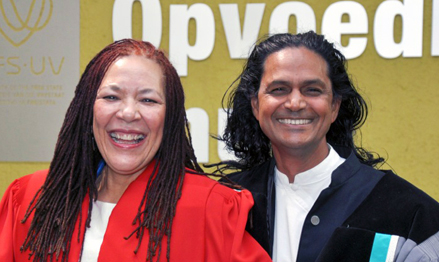Latest News Archive
Please select Category, Year, and then Month to display items
27 December 2021
|
Story Jóhann Thormählen
|
Photo Supplied
 The Kovsie Annerie Dercksen is one of South Africa’s most promising youngsters and climbing the cricketing ladder.
The Kovsie Annerie Dercksen is one of South Africa’s most promising youngsters and climbing the cricketing ladder.
She enjoyed every second of playing with some of her heroes and believes the exposure to international cricket will help her become a better player.
Annerie Dercksen is one of South Africa’s most promising youngsters and climbing the cricketing ladder.
Star from Beaufort West
This second-year Education student from the University of the Free State (UFS), who dreams of playing for the Momentum Proteas, represented the South African Emerging Women’s team three times in 2021.
The star from Beaufort West toured with the side to Bangladesh and also played against Zimbabwe and Thailand in One Day and T20 matches.
According to Dercksen, it is an incredible honour and privilege to be a part of a side.
She soaked up the experience and says everyone was willing to share their knowledge.
“I would have to say, sharing the field with some of my heroes and getting to work with some of the best coaches in the country are some of the highlights.”
She says each tour brought its own challenges and this helped her grow in the way she views and approaches the game.
“In Bangladesh we played against a well-established team in foreign conditions while facing a lot of spinners in spin friendly conditions. Personally, it was quite a challenge and I had to come back and work on some options, especially against spin.”
“Each tour brought its own challenges and this helped me grow in the way I view and approach the game.” - Annerie Dercksen
Coming through the ranks
The all-rounder has come through the ranks. She represented South-Western Districts at school level, played for the South African U19 side and is currently representing the Free State.
But Dercksen didn’t always dream cricket, especially not when playing ‘backyard’ cricket with her brother on the farm.
She didn’t even play for a team at school. “Until a boy from our primary school’s team got sick before a game. A teacher came to class and asked, ‘who can play cricket’, and I put up my hand.”
Rhodes professor calls for accountability in teacher education
2013-11-14
|
 |
Prof Jean Baxen of Rhodes University and Prof Dennis Francis, Dean of the Faculty of Education of the UFS.
Photo: Stephen Collett
15 November 2013 |
Lecture (pdf)
“Our education system needs quality teacher education.”
This was the message from Prof Jean Baxen, Deputy Dean of Research at Rhodes University in Grahamstown. She delivered the Education Public Lecture on ‘The lives of children, citizenship and teacher education: challenges and opportunities’ at the University of the Free State’s Bloemfontein Campus.
Growing up in White River, the rural areas of Eastern Transvaal (as it was previously known), Prof Baxen took the audience on a journey of the imagination. She shared stories of how she and fellow learners walked miles to get to school and how her son found himself in a situation of being unsure about his own racial identity, questioning what it meant to be ‘coloured’. She also related stories of how teachers are not sufficiently prepared to mediate information on HIV/Aids.
These stories revealed how little teachers cared, and also how difficult and challenging it is for learners to cope in such teaching and learning environments – thus calling for quality teacher education.
She stressed the fact that quality teacher education is needed in South Africa to assist in curbing the challenges children and fellow citizens come across in our broader society. “It is important that, as teacher educators, we should groom teachers to find and understand their identity, sexuality, and also the world they live in. There is an urgent need for us to hold ourselves and others accountable and to not distance ourselves and make it someone else’s responsibility – it is our joint responsibility as citizens,” she said.
We need a pedagogy that would navigate and start formulating a language that we could use to face these challenges, she proposed.